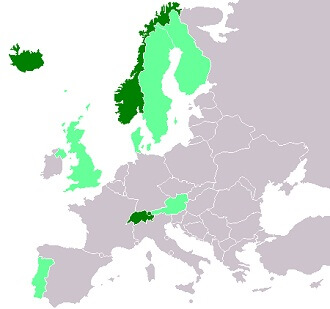Could an EFTA-Style Court be a Potential Option for the UK after Brexit?
Could an EFTA-Style Court be a Potential Option for the UK after Brexit?
 Professor Carl Baudenbacher, president of the European Free Trade Association (EFTA) court, has stated that the UK could create their own laws and allow for flexibility by agreeing to set up such an EFTA court, similar to those seen in Norway, Iceland and Liechtenstein. Prof. Baudenbacher has said that in many cases the EFTA courts have been able to overrule the European Court of Justice (ECJ).
Professor Carl Baudenbacher, president of the European Free Trade Association (EFTA) court, has stated that the UK could create their own laws and allow for flexibility by agreeing to set up such an EFTA court, similar to those seen in Norway, Iceland and Liechtenstein. Prof. Baudenbacher has said that in many cases the EFTA courts have been able to overrule the European Court of Justice (ECJ).
Speaking to the Daily Express newspaper on the independence and the flexibility that the EFTA courts offer its members, he said:
“The EFTA Court is a fully independent court, there are no links to the ECJ. We stand on our own feet. As regards law on the books, we are bound to follow the ECJ’s pre-1992 case law. That set the level playing-field across the Single Market. But as regards to law in action they also follow us in many, many cases. They have followed us, so this imagined one-way street has developed in practice into a judicial dialogue. Judging is not an exact science and to have your own people on the separate independent court has turned out to be an advantage for the EFTA States.”
Independence and freedom granted to EFTA courts
The EFTA system of enforcing regulations is reckoned to be less rigorous than that of the ECJ, which has been criticised by British policymakers and some of the British media for being too intrusive.
Prof. Baudenbacher has outlined several of the benefits that the UK would gain from setting up their own British EFTA court, noting for example:
“Our countries have also kept their sovereignty in the area of agriculture and of fisheries. In fisheries, which are extremely important for both Iceland and Norway, there is a very favourable fish protocol that allows them to keep the catch and to sell in the European Union. Passporting is something else that will be an advantage for the UK, for the City of London, because under the EEA Agreement you have the same passporting rights because you are in the single market.”
In addition, he also rejected statements that the EFTA was being “outgunned” by the ECJ, stating that the relationship between the ECJ and the EFTA courts was “one of dialogue.” He has also highlighted that in certain cases, the EFTA has directly influenced ECJ rulings, rather than the other way around.
At a lecture organised by UKLegalFuture, Prof. Baudenbacher gave an example of the partnership between the two courts and the EFTA’s powers of influence, citing the example of the 2001 case on the marketing of Kelloggs fortified cereal. He stated: “ECJ case law said the national Government may ban the marketing if there is no nutritional need in the country . . . It was a paternalistic approach, we said we don’t follow the ECJ on this. The ECJ then overruled their own case law and followed us, and that made us very proud.”
PM says UK will leave EU court’s jurisdiction
The Prime Minister has insisted the jurisdiction of the European Court of Justice in the UK will come to an end with Brexit. As the government published new details of its position in August, the PM said the UK would “take back control of our laws.”
In its new policy paper, the government does not rule out the ECJ keeping its jurisdiction during the Brexit transition and promises to work with the EU on the “arrangements for judicial supervision” during this period. The paper also reveals that the rights of EU citizens living in the UK after Brexit will only be subject to British law and giving the ECJ authority over EU-UK disputes would be unprecedented and not “fair and neutral.”
Contact our EU and International immigration law experts today
For advice on steering your organisation through Brexit, strategic planning and fulfilling your business objectives, immigration law matters for individuals or businesses, please contact our experienced immigration solicitors today on 03456 381381 or email immigrationteam@ibblaw.co.uk.
